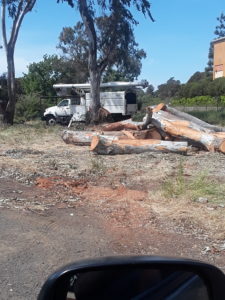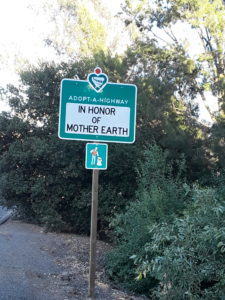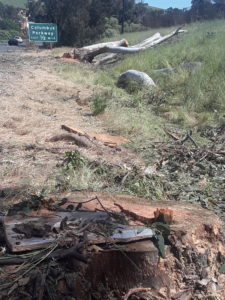
Caltrans has removed numerous trees from I-780. The Benicia City Council unanimously approved a resolution to replace the trees at the June 2 meeting.
(This article originally appeared in the June 12 print edition of the Herald)
BENICIA – At its June 2 meeting, the Benicia City Council unanimously approved a resolution requesting that Caltrans plant replacement trees along the freeways and work with the City and local organizations on other tree planting and maintenance projects.
The Benicia Tree Foundation raised the issue of Caltrans removal of trees from local freeways at a prior City Council meeting. The letter to the City Council can be found on the Benicia Tree Foundation website, info@benicia.trees.org. Since the resolution was adopted, City staff reported that the offices of State Senator Bill Dodd and Assemblymember Tim Grayson have arranged meetings with Caltrans to discuss potential solutions.
Mayor Elizabeth Patterson said she was contacted by a resident about the recent removal of vegetation at the north end of the Carquinez Bridge, so the Council expanded the resolution to request restoration planting at this location on I-80.
Over the past two years, the Benicia Tree Foundation has requested approval of tree planting and maintenance projects with Caltrans through its Adopt-a-Highway program without success.
“Hopefully the resolution will form the basis of constructive discussions between the City and Caltrans for tree replacement on our freeways and improved care for trees at the I-680/I-780 interchange area north of the Benicia-Martinez Bridge,” said Adopt-A-Highway volunteer Sindy Harris.
The Adopt-A-Highway Program resumes
Benicia is fortunate to have two Caltrans’ Adopt-A-Highway volunteer teams to keep the I-780 clean. Republic Services, the City’s garbage company, has adopted the stretch of freeway from Fifth St. westbound to 200 yards or so past the Southampton ramps. Sindy Harris and her husband, Steve Morgan, are the “In Honor Of Mother Earth” couple that have adopted the rest of the I-780. This particular stretch of freeway includes approximately 12 miles, counting both sides of the freeway and the ramp areas.
The stretch runs from 200 yards or so past the Southampton ramps westbound to the I-80 interchanges. Both of these areas are marked by signage, showing the adopter. Some areas along the I-780 are “red zones” for adopters; only Caltrans can keep them clean.
Those areas include the bridge, the mile or two until Fifth St., the median, and some parts of the I-80 interchanges.

Sindy Harris and Steve Morgan make up the In Honor of Mother Earth Adopt-A-Highway volunteer team for I-780 in Benicia.
“Some areas like the I-680 into Benicia and the Bayshore freeway ramps have simply not been adopted by any volunteers, and Caltrans rarely cleans them, as it rarely does any of the areas in their jurisdiction,” said Harris.
Harris and Morgan have been Caltrans volunteers with the AAH program for over two years. During that time, they have done their best to keep their stretch of the I-780 litter free.
The AAH program was suspended in March 2020, as part of the closures and Executive Orders mandated by Gov. Newsom. “No doubt you have seen the many white bags along our stretch of the freeway!” said Harris. “As many of you know due to the press we received, Steve and I turned our attention to Benicia and Vallejo’s “dirtiest” streets and picked them up (or big parts of them), while the AAH program was suspended.”
The team picked up Bayshore Rd.; Columbus Parkway; Southampton Drive; Curtola Parkway; Benicia Rd.; Laurel St. and Spruce St. Several of these streets the team picked up twice; others only once, and they are already trash-filled again.
The Adopt-A-Highway program is now resuming. The “In Honor of Mother Earth” couple will be back to cleaning up their stretch of the freeway on Monday, June 15.
“It is a much different stretch now that Caltrans has removed so many trees,” said Harris. “But, I am hopeful that Benicia Tree Foundation’s resolution adopted by the City Council will start the ball rolling on a replanting effort by Caltrans.”
Harris notes that streets in both Benicia and Vallejo are “truly” trashed. After three months of cleaning these filthy streets, it revealed how ubiquitous litter, illegal dumping, abandoned homeless camps, fouled streams and culverts with poisonous trash (such as paint cans, cleaning products, etc.) really are.
As Harris understands it, neither Benicia or Vallejo has any crew to pick up these streets or keep pollutants out of the cities’ stormwater, which ultimately drains into local streams and the Carquinez Strait.
“This job apparently falls entirely to good citizens alone to use their own time and effort to keep these thoroughfares clean. This is unacceptable to me and hopefully to others who love our towns,” said Harris. “As we leave one effort (the dirtiest streets) for another (back to the I-780), I can only hope that we brought enough attention to this problem that citizens and our respective cities’ leaders will take notice and start problem solving a solution.”







Leave a Reply